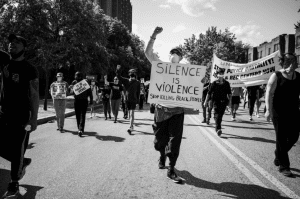Previous installments in this series: Intro to BLM; Marxism; Is BLM Marxist?; Violence.
Last time, we tried to explain direct action, violence, and self-defense. Now we’re in a better position to answer the question: does BLM support violence?
The obvious answer—which is not necessarily the right answer—is no. BLM was formed in opposition to police violence against Black people. Their reason for existing is anti-violence in at least one big way. Moreover, they have this to say about their own mission:
We believe that in order to win and bring as many people with us along the way, we must move beyond the narrow nationalism that is all too prevalent in Black communities.
We work vigorously for freedom and justice for Black people and, by extension, all people. … In affirming that Black Lives Matter, we need not qualify our position. To love and desire freedom and justice for ourselves is a prerequisite for wanting the same for others. … We make our spaces family-friendly and enable parents to fully participate with their children. … We embody and practice justice, liberation, and peace in our engagements with one another.1
Like I said, this on-paper answer is not necessarily correct. There’s only so much trust we should give any organization’s claims about itself, from Oxford University to the Church of Scientology. Besides, a group’s stated goals are quite a different thing from their actual behavior, even when everybody means well. But, for whatever self-reporting is worth, this is BLM’s self-report. In the absence of other evidence, since we shouldn’t assume the worst of people for no reason, we’d accept this as evidence that BLM probably doesn’t support or practice violence.
But we do have other evidence. So let’s turn to that.

Now, it’s important to make a couple distinctions here. One is the difference between BLM the organization and BLM as a slogan. Lots of people use the slogan “Black Lives Matter” without necessarily having any connection to the organization.2 Obviously BLM shouldn’t be held responsible for the behavior of everybody who happens to use the slogan. You might as well hold the Vatican responsible for everything Anglicans do because they both recite the Nicene Creed.
The other is that accusations are not the same thing as evidence. When we’re talking about purported riots and the like, evidence means things like eyewitness testimony, audio and video footage, damaged property, hospital records, and so on. An interpretation of evidence, even a fair interpretation, is not itself a piece of evidence.3 Not every claim about a riot, or an organization, or the cops, or whatever, is based on evidence.
And just like last time, where we said violence by itself doesn’t make a group bad until we know the context: this is something police apologists clearly accept. They have no problem saying the claims made by groups like BLM are lies—or at least, flawed interpretations of the facts. You can repeat a claim any number of times without it becoming any more true. And a report that’s based on other reports, either without citing evidence proper or without putting the evidence in context, really doesn’t tell you much except that you’re listening to a sloppy report.

So. If we’re going to try and evaluate whether BLM supports violence, we need the following:
- evidence of violence (not just accusations),
- done by people specifically linked to BLM as a group (not just as a slogan),
- given with enough context, and
- interpreted in a believable way.4
Okay? Okay.
Further installments: Is BLM Violent?, Is BLM Anti-Family?, Does BLM Support the Gay Agenda?, Does BLM Support Abortion?, and So What?
1These come from BLM’s “About Black Lives Matter” and “What We Believe” pages.
2BLM itself is just one of several groups advocating Black civil rights. For example, M4BL, the Movement for Black Lives, is another umbrella group with affiliates and supporters across the country.
3The difference can get subtle. For instance, a protester who was injured by a police officer at a protest might sincerely believe the officer did it on purpose when it was actually an accident. But the protester’s flawed interpretation of events wouldn’t invalidate the fact that they were injured by the police officer.
4There’s some grey area around “enough context” and “believable interpretation,” yes. I’m not prepared to give a hard line here; it’s kind of a sliding scale. Still, there are things we can rule out—a four-second video clip probably doesn’t have the context it needs, and an interpretation that people are being mind-controlled by aliens is not super believable.












